Be Finance Day looks at alternatives to bank financing and puts forward a new ethical economy model
The first edition of EADA’s Be Finance Day was attended by over one hundred people of different professional profiles but all with a common interest: to grasp the current economic context. All of them came to the event looking for answers concerning burning current issues such as the viability of a more ecological and sustainable economic model, alternative sources of funding to bank loans for starting up a business or expanding a corporate project or the new rules of the game in the international economic arena.
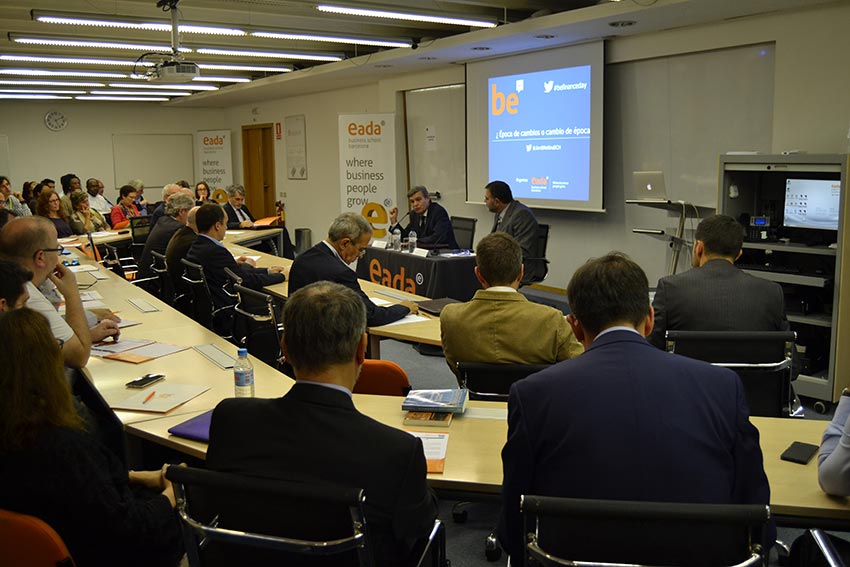
Before focusing on all these aspects, the general director of EADA, Miquel Espinosa, inaugurated the day forum along with the dean of the Col·legi d’Economistes de Catalunya, Joan B. Casas. Both of them outlined the agreement they had signed prior to Be Finance Day which involves various lines of collaboration such as special terms and conditions for becoming a guild member or for enrolling on an EADA programme or the chance to take part in activities such as conferences, day forums and opinion forums, among other things.
New economic scenario
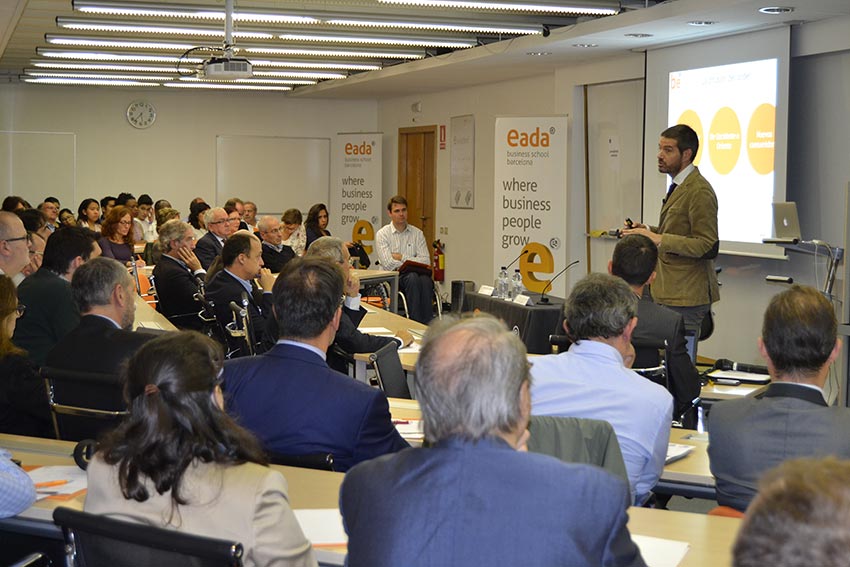
Be Finance Day started off with an interesting talk by Jordi Molina, an entrepreneur and EADA associate professor in Company Policy, concerning the current state affairs of the international economy. As he explained “we are witnessing a series of profound changes which affect society as a whole, from governments and states to companies and citizens”. He was referring primarily to constant technological innovations, “that have enabled startups and SMBs to compete in the global environment with multinational companies”. But he also stressed the increasingly prominent role played by emerging economies –especially India, Brazil, Mexico, Russia, Indonesia and Turkey– in the international economic arena. In his opinion “economic potential is shifting from the West to the East and from the north to the south”.
In this context of constant change, Mr Molina pointed out that, “organisations can no longer plan in the short term and, what’s more, expertise in one area loses value because one area of knowledge is soon replaced by another”. To which he added, “the faster and faster transition between one business model and another and the increasingly more decisive role of prosumers, in other words, consumers who help to improve a product, who are influential and who opt for collaboration in detriment to ownership”.
New sources of funding
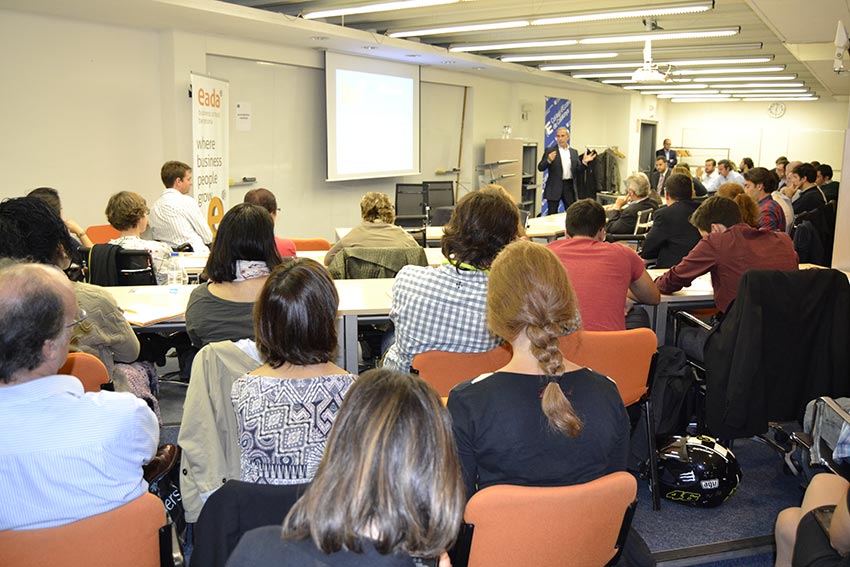
Miquel Sacristán, director of the Business Angels Network of the Col·legi d’Economistes de Catalunya (Economistes BAN), outlined alternative sources of funding to banks which companies can access today. He began his presentation talking about crowdfunding “which enables start-ups to raise funds from small investors in return for equity”. According to Sacristán, “this sector is being regulated thanks to the new Law 5/2015, which distinguishes between non accredited investors- who are not allowed to invest more than 3,000 euros per project or over 10,000 euros a year– and accredited investors– who once they have obtained accreditation have no limits to the amounts they can invest”.
There is also the debt crowdfunding option, better known as crowdlending, “whereby small investors offer companies small loans in exchange for interest on their loan”. In addition, a startup can always seek out a business angel “an investor with knowhow and expertise in the world of entrepreneurship who may decide to allocate their capital to activities they are familiar with”. And he went on to add: “Business angels, especially, BAN, get involved in the management of the company and contribute their know-how –smart money– and networking, in addition to taking on high risks and seeking high profitability”.
Strategies for funding a project
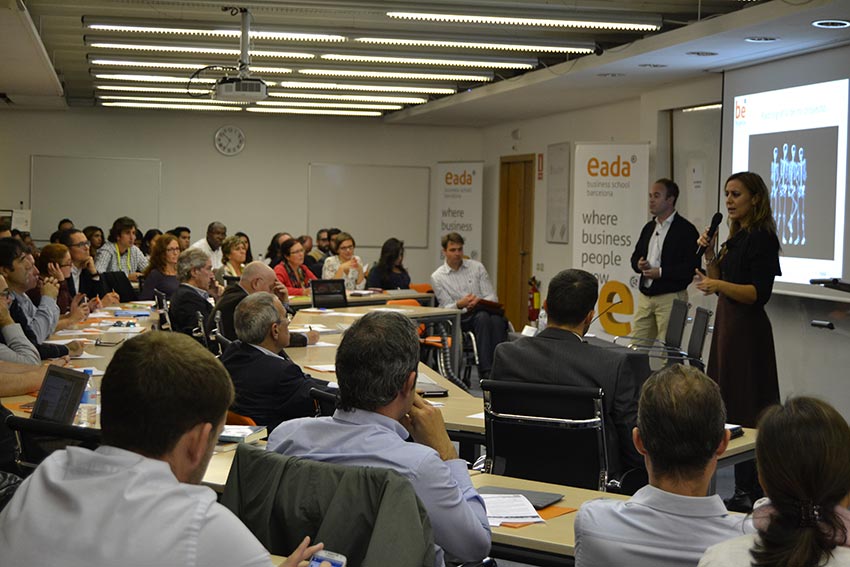
Be Finance Day also looked into the forms of financing that companies can opt for depending on their stage of maturity, whether it be in order to launch a project from scratch or for making it grow. These options were outlined by Bárbara Muñoz and Daniel Wuhl, EADA associate professors specialised in Strategy, Business models and Corporate financing.
More specifically, they defined four phases: the first phase –the first three months– would require an investment of 20,000 to 30,000 euros for the project, design and test phase. Here we are talking about owner financing plus family & friends. The second phase –from 6 to 12 months– would require an amount of 100,000 to 200,000 euros. “In this case”, according to the speakers, “the project has passed the test phase and must begin to grow”, and they recommended 75% private funding –business angels and individuals– and 25% public –public bodies– or commercial – a bank loan–. In the third phase –after 18 months– the business would need 500,000 to one million euros. “The business is now running and it needs to grow and to do so it must seek out private equity funds specialised in the startup phases”. Finally, during the fourth phase –from 24 months onwards- it will require two to five million euros. According to Bárbara and Daniel, “the project needs to be consolidated and grow internationally and it can opt for more general and development equity funds”.
The Economy for the common good
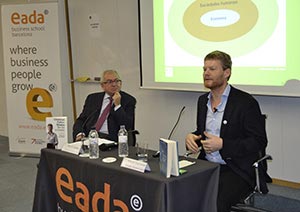
Finally, Christian Felber, a philologist, politologist, psychologist, sociologist and professor of Economics in various European universities, closed the day forum with an interesting lecture on the need to replace the current system with an ethical economy model. This is the central idea of his theory on “the economy for the common good” which puts forward a new economic model based on the values of human dignity, solidarity, environmental sustainability, cooperation, social justice and democracy. “It is a holistic and alternative model that takes into account the planet and its ecosystems, which respects society’s values and abides by the rules of democracy” he pointed out.
In order to achieve this, Felber stressed the need to replace the orientation towards profit and competition with contributing to the common good and cooperation. And, what’s more, “capital must be the means for accomplishing the common good, which must constitute the ultimate goal of economic development as well as the criterion by which economic success is measured”. In other words, “the economy must become a tool at the service of society, respecting the environment and democratic rules”.
According to the speaker, “we are beginning to witness a change in trend towards this model such as, for example, companies that already implement the common good balance sheet, the proliferation of ethical banks and municipalities for the common good, academic institutions that are changing their way of understanding the economy and also citizens, who are increasingly opting in favour of socially responsible companies”.
